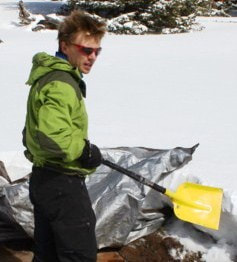I take a very broad definition of ecohydrology, which is the interaction of water and ecosystems. My personal interests are in the movement of water within and through terrestrial ecosystems (mountain ecosystems to be even more specific). While the foundations of ecohydrology developed by Peter Eagleson and others focused on arid vegetation water use remain important, I am excited by a more inclusive vision of ecohydrology for the 21st century that engages a wide swath of diverse people to tackle critical societal problems.
What are your undergraduate and graduate degrees in?
All of my degrees are in engineering departments that were previously agricultural engineering. I did my undergraduate and masters degree at Virginia Tech University in the Biological Systems Engineering department. I then completed my Ph.D. in the Biological and Environmental Engineering department at Cornell University in 2010.
How did you arrive at working in/thinking about ecohydrology?
I have always been interested in water since my earliest memories in the creeks in our backyard in western Washington. During the first two summers of my undergraduate engineering degree I was a raft guide on the Snake River in Wyoming. I believe this experience focused my interests on hydrology. During my masters degree I designed a large particle image velocimeter to measure stream discharge and started playing in streams. For my Ph.D. work I was interested in catchment hydrology and streamflow generation processes, which led me to research projects in the Catskill mountains. However, it was not until my first postdoctoral positions at the University of Arizona and University of Colorado that I recognized the potential to help develop the field of mountain ecohydrology, focused on montane forest ecosystems and there interactions with snow and catchment hydrology. The culmination of this scientific training and mentorship leaves me with the opinion that the ‘big’ research questions in mountain hydrology lie at the interface of hydrology and ecology.
What do you see as an important emerging area of ecohydrology?
Using novel observations to better simulate mountain vegetation in hydrological models will be critical to predicting future water availability. For example, our hydrology models often make simplistic assumptions about rooting depth and architecture, but are highly sensitive to these parameters. Similarly, knowing at what depths vegetation are extracting water is critical to accurate predictions of response to water stress. Another example that is a focus of my research in the Sierra Nevada, is improving understanding of how forest vegetation will respond to earlier snow melt and water inputs. Do trees utilize earlier snowmelt and rain water? How do these trees fare later in the season during a drier growing season? How does this alter larger scale carbon budgets? Key to resolving these questions and vegetation in hydrological models more broadly, is leveraging new and better observations. While I don’t expect a ‘silver bullet’ observation technique in the near future, the ability to co-locate more and more observations like eddy covariance, sap flow, and micrometerology, geophysics, and isotope hydrology to measure ecosystem water use in multiple ways has the potential to revolutionize the field.
Do you have a favorite ecohydrology paper? Describe/explain.
I cannot pick a single favorite paper in ecohydrology, but the paper by Elizabeth Garcia in 2016 (Garcia et al., 2016) has all the pieces of a classic ecohydrology paper and is highly relevant to the emerging research areas identified above. Garcia et al. show that the carbon allocation scheme of the vegetation (e.g. whether they store carbon above or below ground) has implications for water use efficiency and ultimately streamflow. They combine observations, models, and theory to show that current ecohydrological model predictions may be neglecting key processes driving their response to climate change. Garcia et al. (2016) made me reflect considerably on linkages between water and carbon cycles in Sagehen Creek, one of their study sites, and what new observations we could leverage to answer this problem. This paper forced me to learn new things and broaden my understanding of key ecohydrological processes, which has ultimately led to new insight and better research in this topic.
Garcia, E. S., Tague, C. L., & Choate, J. S. (2016). Uncertainty in carbon allocation strategy and ecophysiological parameterization influences on carbon and streamflow estimates for two western US forested watersheds. Ecological modelling, 342, 19-33.
What do you do for fun (apart from ecohydrology)?
My most important work outside of office, field work, and classrooms takes place at home with my wife and almost 2-year old daughter. We like to explore our local Sierra Nevada and Great Basin mountains, as well as do big summer camping trips in the West. When life permits, I try to sneak out for bike rides and telemark turns around Reno and Lake Tahoe.

 RSS Feed
RSS Feed